- Home
- Anthony Burgess
Collected Poems
Collected Poems Read online
ANTHONY BURGESS
Collected Poems
CARCANET CLASSICS INCLUDE
Dictator/Gilgamesh adapted by Philip Terry
Gilgamesh Retold by Jenny Lewis
Pearl translated by Jane Draycott
Edmund Blunden, Selected Poems edited by Robyn Marsack
Catullus, The Books of Catullus translated by Simon Smith
Rebecca Elson, A Responsibility to Awe: Collected Poems
John Heath-Stubbs, Selected Poems edited by John Clegg
Walter Pater, Selected Essays edited by Alex Wong
Propertius, Poems translated by Patrick Worsnip
Arthur Rimbaud, Illuminations translated by John Ashbery
George Seferis, Collected Poems translated by Edmund Keeley and Philip Sherrard
Charles Tomlinson, Swimming Chenango Lake: selected poems
edited by David Morley
William Carlos Williams, Collected Poems, volumes I and II
edited by Walton Litz and Christopher MacGowan
ANTHONY BURGESS
Collected Poems
Edited with an introduction by Jonathan Mann
THE COLLECTED POEMS OF ANTHONY BURGESS
John Anthony Burgess Wilson (1917–93) was an industrious writer. Through over fifty published books, thousands of essays, and countless other drafts and fragments, he articulated the struggles, freedoms and changes that he saw around him, and predicted many more to come. Perhaps his most famous example is A Clockwork Orange (1962), originally an indifferently-received novella which was later adapted into a controversial film by Stanley Kubrick, and provided Burgess with plentiful opportunities to explain his particular artistic vision. The linguistic innovations of that novel, the strict formal devices used to contain them, and its remarkable range of themes are all firmly present in Burgess’s poetry.
Now he no longer appears on our screens, it is easy to forget that Burgess was an irrepressible international literary figure whose work was disseminated through the mass media of the 1970s and 1980s. He was many things at once, some of them seemingly irreconcilable. There are in fact many Burgesses to choose from: novelist, composer, teacher, drinker, linguist, husband, rebel, journalist, diarist, extrovert, family man, cook, smoker, art critic, literary critic, television critic, television personality, collector of matchbooks, and – last but not least – poet. His flair for words, formal discipline, experimentalism, and fondness for variousness echoes equally through his music, his novels, his journalism and his literary criticism. These aesthetic competences are abundantly represented in this book.
THE COLLECTED POEMS OF ANTHONY BURGESS
Anthony Burgess
Edited with an introduction by Jonathan Mann
Per Liana e Antonio
CONTENTS
Introduction
Acknowledgements
Longer Poems, Sequences, and Narrative Works
An Essay on Censorship
Belli’s Blasphemous Bible
Moses
Poems Written for St Winefred’s Well
The Pet Beast
Signs (Dogs of Peace)
‘Augustine and Pelagius’
The Princely Progress
Five Revolutionary Sonnets
To Vladimir Nabokov On His 70th Birthday
The Sword
O Lord, O Ford, God Help Us, Also You
Personal Verse, Vignettes, and Other Short Work
Words for Music
Endnotes
Sources and Further Reading
Alphabetical List of Titles or First Lines
INTRODUCTION
Anthony Burgess was a versatile and productive poet whose career began in 1935 when a few adolescent poems were published in Manchester Xaverian College’s magazine The Electron. Over the course of his career, Burgess wrote many hundreds of poems, lyrics, fragments, and occasional verses – everything from epic poetry to linguistically innovative experiments. Most of his novels include original poetry, frequently as a central plot device. This is especially evident in the Enderby novels, which feature poems written by Burgess but published under the fictional nom de plume F.X. Enderby. Notably, his words for music were heard on and off Broadway, and almost featured in a Warner Brothers film (Will!, 1968). The 1973 musical Cyrano (starring Christopher Plummer) was a commercial success thanks in no small part to Burgess’s verse. Burgess’s 1976 epic verse novel Moses was the literary product of an equally epic Italian television series. Likewise, the verses and songs from Burgess’s Man of Nazareth (1979) arose out of a collaboration with the award-winning film and television director Franco Zeffirelli. His poetry career ended with a remarkable novel in verse (Byrne, posthumously published 1995), whose form was borrowed from Byron.
In his autobiography You’ve Had Your Time, Burgess says he sent his poems to T. S. Eliot, who sent back a mildly approving letter of rejection. Whilst that letter remains unfound, another letter in a private collection shows that, in 1954, Burgess’s poetry was subject to the formal scrutiny of another literary critic. Gareth Lloyd-Evans, a noted Shakespearean scholar, judged Burgess’s poetry as a part of a competition held by his local newspaper. Burgess won the competition, and saw his work published on the front page of the Banbury Guardian on 27 May 1954. In his note to the winner, the judge praised Burgess’s imagery and linguistic innovation, but found his rhythm a little shaky. The short note is (so far) the only available review of Burgess’s earlier poetry by an informed contemporary critic, who found:
These are very accomplished poems indeed, and I suspect you are an old hand at the game. Have you published? If you haven’t, then you ought to, immediately. I find your imagery particularly exacting – e.g. in Sonnet 1. The image of the cock is brilliant. The ‘idea’ in Sonnet 1 is simple enough, but your language has given it a depth (almost a mystery) which is most satisfying. You might look over your rhythm again – it is occasionally jerky – noticeably so in Sonnet 2 where the transition from line 8 to 9 is rhythmically awkward. Congratulations on two first rate poems which easily take the prize.
The critical note is signed ‘G.L.E.’. The two sonnets in question were ‘A dream yes, but for everyone the same’ and ‘They lit the sun, and their day began’, part of the Revolutionary Sonnets sequence. Writing about this competition, Burgess notes that the newspaper regretted having to publish his poems. ‘What the readers of the Banbury Guardian made of this sonnet’, he says, ‘was never recorded’.1
Another analysis of a Burgess poem came from the poet himself in the 1970s. Perhaps as a literary joke, Burgess reviewed a poem by F.X. Enderby in They Wrote in English, an anthology of major Western writers.2 That poem is ‘Garrison Town, Evening’ (see p. 00). As the only available example of Burgess explicating his own poetry at length, it is worth reproducing here:
The opening line is a reminiscence of the opening line of a song by Henry Purcell – ‘Nymphs and shepherds, come away.’ The scene is a town in which a great number of soldiers are stationed in wartime. In the evening they emerge from their barracks and look for girls, who are willing to be looked for. Thus, Faunus, the god of fertility or certainly physical love, uncovers what was hidden during the day – the libido, or human will. This reminds the poet of the philosopher Schopenhauer, who taught that the only real thing in nature was a huge impersonal Will, or ‘Wille,’ that created illusions or phenomena or representations (‘Vorstellungen’) which we take for reality. The ‘Wille’ is a cinema projector, and it projects these ‘Vorstellungen’ (German for cinema shows) on to a screen. The projector is also a penis, and also a pig’s snout, thoroughly bestial. Pigs thrust their snouts into the earth, looking for truffles. Low girls, or doxies (an Elizabethan term), instead of being ill-favoured and pimply, become m
att, smooth, silver screens. The projectors or penises of the soldiers, expressive of the great natural Will, shine light [on] them which makes them appear attractive. Their ‘trappings of the sport’ are those physical appurtenances which are engaged in the act of sex. An ejaculation is achieved, and it is likened to a fiery rocket shooting high into the air. At the moment of ejaculation the girls seemed at their most beautiful. But there is an immediate revulsion of ‘tristia post coitum’, and this is likened to the theory of another German philosopher, Spengler, who in his ‘Decline of the West’ says that all civilisations decay, tracing a falling curve or parabola.3
The decision to include and review the poetry of his fictional alter ego may have been a literary joke, or a convenient way to explain a favourite own poem. Either way, it demonstrates that Burgess wished to explain the poem. It was not the first time he reviewed his own work. In 1968, Burgess lost his job at the Yorkshire Post when he supplied an unflattering review of Inside Mr Enderby. Later, in This Man and Music (1982), Burgess discussed his own poetry again in his analysis of a novel with verse interludes, Napoleon Symphony (1974). This time, though, there was no trickery; readers knew it was Burgess reviewing Burgess. His short analysis does not explain how the language of the poems functions, but it does name T.S. Eliot, Tennyson and Gerard Manley Hopkins as key influences for the work.
The fictional poet F.X. Enderby remains a core connection between Burgess’s novels and poetry. All the way through the four Enderby novels (published in 1963, 1968, 1974 and 1984), Burgess’s poetry is described as written by the eponymous poet. This raises a question about authorship that has only been tackled in passing by a few critics of Burgess’s poetry, and remains unresolved. In a 2003 article, the French writer and critic Sylvère Monod – who edited a short selection of poems for the journal TREMA in 1980 – points out that Burgess was a poet in his own right, and one with an already long poetic career by 1980. While he admits to initially overlooking the Enderby/Burgess authorship issue, Monod focuses his attention on exploring the Enderby poems simply as plot devices in the novels. However, the discipline and linguistic inventiveness of the poetry suggests it is more than just functional plot-matter. As Kevin Jackson puts it in his foreword to Revolutionary Sonnets (2002), ‘a man who set scant if any store by verses he had composed more than thirty years earlier would hardly have troubled to embed them so prominently’. In a foreword to the essay collection Anthony Burgess and Modernism (2008), David Lodge tackles the identity problem by simply focusing on Enderby as the author. Viewing Enderby as a modernist poet, Lodge compares Enderby to William Empson or Edward Thomas. Lodge and Monod, then, provide some brief commentary on Burgess’s Enderby poems, but do not fully define the relationship between Enderby and Burgess.
Laurette Véza – also writing in TREMA in 1980 – explores how Burgess’s influences are frequently echoed in the Enderby poems. Unlike Monod, Véza seems to separate Burgess from Enderby. She describes Burgess as a formalist poet who loves words, not emotion, praising the word play and clarity of the Enderby poems. In exploring this relationship between allusion and lucidity, she highlights how the Enderby poems seem to verge on parody, deciding that such parody is related to cultural heritage. Véza’s critical appraisal passes comment on the poems in their own right, and not just as plot devices. Usefully, Véza emphasises the difference between the fictional poet Enderby and the actual poet Burgess.
Although they are substantial, the Enderby poems are only part of Burgess’s career as a poet. In the 1970s especially, Burgess’s long-form poetry found large audiences away from the Enderby books. He was at his most productive in this form between 1974 and 1976, although long poems had featured in his novels The Worm and the Ring (1961) and One Hand Clapping (1961). In just two years, Burgess published Moses and Napoleon Symphony, as well as including the long poem ‘Augustine and Pelagius’ in The Clockwork Testament. Then, in 1975, Burgess published another long poem (‘In Memoriam Wystan Hugh Auden KMT’) in the Mark Twain Journal.
To be sure, writing much is no qualification for greatness in itself. And yet, Burgess’s poetry manages to combine sheer volume with linguistic ambition, frequently achieving equal levels of success. Indeed, the current corpus would be an impressive collection for one who had simply focused on being a professional poet. Given that – by the 1970s – Burgess had achieved fame and fortune as a journalist, translator, prolific novelist, visiting lecturer and vociferous literary critic, it is tempting to ask how he managed to produce such varied and voluminous poetry in between everything else. Moreover, longer poetry within Napoleon Symphony, ABBA ABBA, Moses, and – later – Byrne reveals Burgess as a fastidious formalist with a sharp eye for literary tradition and a keenness to exploit the quirks of the English language to the full. His poetry of the 1970s is enormous and enormously ambitious. In his poetry as much as his novels, he is unafraid to play with the words of his literary predecessors. Moreover, following T.S. Eliot especially, Burgess was keen to unite old traditions with modern sensibilities. In this way, the poetry records or extends the multiplicity of styles and traditions he devoured with such delight. No wonder Malcolm Bradbury’s obituary of Burgess described him as a ‘postmodern storehouse’. His poetry – like the rest of his literary and musical endeavours – moves the borders of western traditions. Especially in these more expansive works, Burgess’s regard for poetic tradition is so strong that it is sometimes hard to hear his own voice in among the celebratory echoes of other poets. Yet, the scale of the enterprise, alongside the regard for literary history, offers his readers a unique opportunity to explore nothing less than this.
Revolutionary Sonnets (2002), edited by Kevin Jackson, introduces Burgess’s poetry to the general public via a small selection of previously-published verse, following a brief but extremely helpful introductory essay. This compact edition contains miscellaneous poems and poem fragments as well as extracts from Moses (1976). These are presented alongside translated verse and libretti, including Cyrano de Bergerac (1971 and 1985), Oberon (1985), Carmen (1986), and Oedipus the King (1972). Jackson’s edition does not include any unpublished works from the archives, such as ‘The End of Things’ or ‘An Essay on Censorship’. Nor is there any reference to St. Winefred’s Well. A notable editorial decision in Jackson’s selection is to ‘hand the daunting task of editing The Complete Poems of Anthony Burgess on, with all good wishes to someone who finally has the nerve to tackle it’. He does, though, identify some poets who he believes are influential to Burgess. Eliot, William Empson, and Ezra Pound are found to be likely influences, along with ‘perhaps a jigger or two of Robert Graves’. Jackson’s edition is brisk, entertaining, and shines a light on some notable representative samples while avoiding archival adventures.
The present collection is the first to bring Burgess’s significant poetic works into one volume. However, readers may be surprised to learn that the present edition is technically the fourth attempted collection of Burgess’s poetry. In February 1978, a J.J.W. Wilson contacted Burgess to propose an anthology based on the poems published in The Serpent, Manchester University’s student magazine. This would have included eight poems by Burgess, alongside other poets’ work4, and would have been called Juvenilia. Wilson proposed that he and Burgess share 40% of the fees, with 60% going to the other contributors. The other poets would have been Peter Cadle, Ashley Merlin Cox, and John Allan Wilson (the John A. Wilson who appears in Little Wilson and Big God), all former Manchester University students. In a later letter to Burgess from April 1978, Wilson notes that he has asked Glenda Jackson to write a short introduction, no doubt hoping to boost sales. Signalling Burgess’s evident ambitions to have a reputable publisher commit his work to print, Wilson says he ‘sent a copy of the typescript to Frank Pike of Faber & Faber as you suggested’, who – in a later phone call – said the anthology would probably not see publication. Pike was, of course, correct.
Two years after Wilson’s proposed anthology, a short collection by the
French literary journal TREMA (1980) gave a handful of poems exposure to a limited specialist readership. The third, twenty-two years after that, Revolutionary Sonnets (Carcanet, 2002), made good ground in representing the range while acknowledging its incompleteness. The present fourth published collection, then, adds to at least thirty-seven years of Burgess scholarship, including around eighteen years of my own. Despite its long genesis, the present collection remains a work in progress, given that new material is frequently being discovered around the world. It is likely that even more Burgess poems will have been uncovered after Collected Poems is published. Perhaps they will be previously unknown poems, or ‘new’ versions of poems included in the present edition that further help us understand Burgess’s compositional processes. Perhaps another verse novel will appear, or yet another verse play. Editors of Burgess have to be resilient and organised in the face of his sometimes overwhelming posthumous productivity.
In an obituary published in the Independent on Sunday, Malcolm Bradbury called Burgess a ‘postmodern storehouse’. However, Burgess was also a key component of the literary marketplace. His archival papers reveal a professional writer whose poetic ambition was mirrored by his large (and mostly extant) library. His literary criticism was erudite and relevant. That is to say, Burgess’s poetry articulates the multiplicity of traditions, forms, and styles of his time, some of which were arguably pushed forward by his plentiful contributions. Projects such as ‘Belli’s Blasphemous Bible’, Moses, and ‘An Essay on Censorship’ crucially combine respect for traditional forms, epic intention, and linguistic experimentation. More modestly-sized works such as Revolutionary Sonnets and many other individual pieces share this combination, but in an artfully compressed way. Both the shorter and the longer poems speak to his modernist influences. Burgess’s linguistic gifts are equally balanced in a hundred or a hundred thousand words.

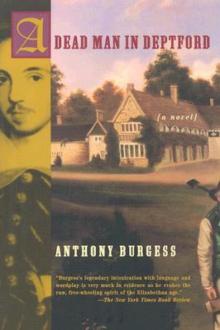 A Dead Man in Deptford
A Dead Man in Deptford Honey for the Bears
Honey for the Bears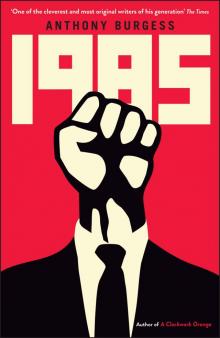 1985
1985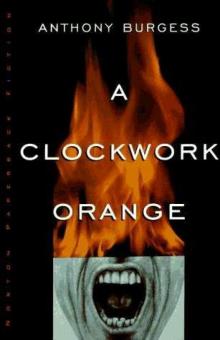 A Clockwork Orange
A Clockwork Orange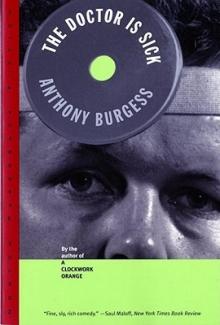 The Doctor Is Sick
The Doctor Is Sick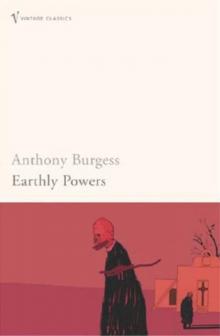 Earthly Powers
Earthly Powers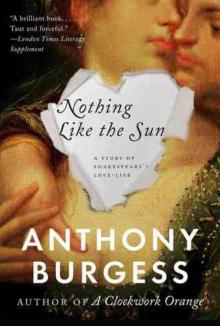 Nothing Like the Sun
Nothing Like the Sun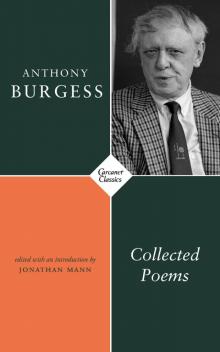 Collected Poems
Collected Poems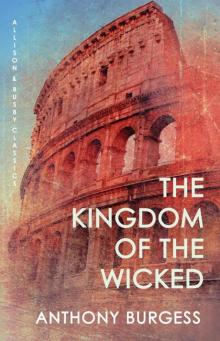 The Kingdom of the Wicked
The Kingdom of the Wicked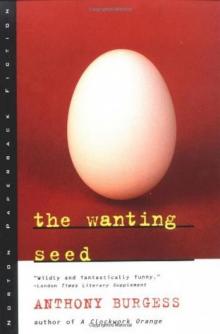 The Wanting Seed
The Wanting Seed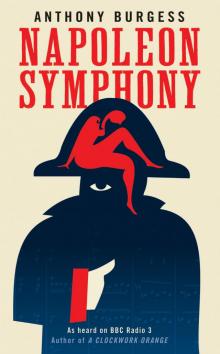 Napoleon Symphony
Napoleon Symphony The Malayan Trilogy
The Malayan Trilogy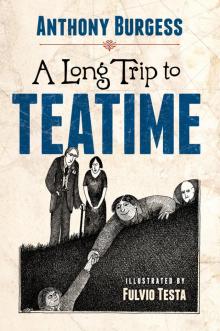 A Long Trip to Teatime
A Long Trip to Teatime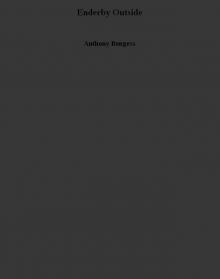 Enderby Outside
Enderby Outside M/F
M/F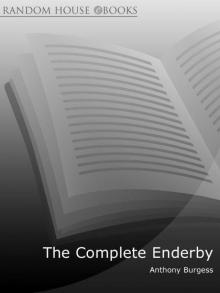 The Complete Enderby
The Complete Enderby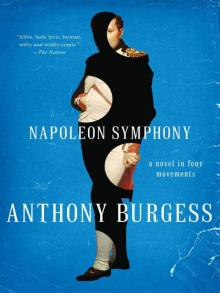 Napoleon Symphony: A Novel in Four Movements
Napoleon Symphony: A Novel in Four Movements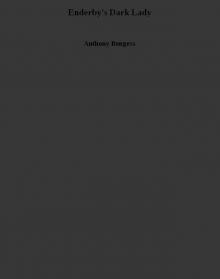 Enderby's Dark Lady
Enderby's Dark Lady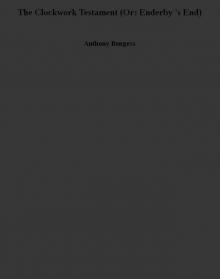 The Clockwork Testament (Or: Enderby 's End)
The Clockwork Testament (Or: Enderby 's End) ABBA ABBA
ABBA ABBA A Clockwork Orange (UK Version)
A Clockwork Orange (UK Version)